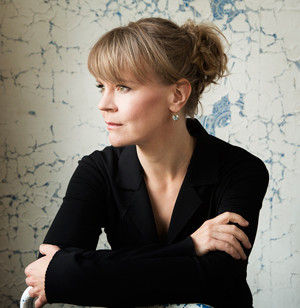by Mike Telin

This week’s concerts will also mark pianist Jeremy Denk’s Cleveland Orchestra debut in performances of Bartók’s Piano Concerto No. 3. “Jeremy and I performed this concerto a few months ago in San Francisco,” Mälkki pointed out. “He plays it beautifully, so I’m very happy to be able to do it again with him.” The concert will also include Stravinsky’s complete ballet music to Pétrouchka. “It’s just incredible music and I’m so thrilled to be able to conduct it again.” The program will be repeated on Friday, April 24 in Finney Chapel as part of the Oberlin Artist Recital Series, and on Saturday, April 25 at Severance Hall. Both performances will begin at 8:00 pm.
“It is my debut and I am very excited,” said the engaging Susanna Mälkki. “Of course, the orchestra has an amazing reputation. I’ve heard them in concert in Europe and in Florida, but this will be my first time working with them.”
Commissioned by and premiered at the Norfolk Festival in Connecticut, The Oceanides was composed by Sibelius in 1914. The work is based on the Greek mythological feminine spirits who live in the waters, called “Aallottaret” in Finnish or “Spirits of the Waves.” “It’s a piece Sibelius was extremely happy with,” Mälkki said. “There are so many different elements in the writing. They are all Sibelius, but not necessarily as we often hear him. Sometimes this piece has been referred to as impressionistic, which maybe is because of the French color that is in it. I love it. It reminds me of those beautiful songs that he wrote for voice, where in a very short amount of time you can have an incredibly deep journey.”
“It begins with a pastoral mood, and in very little time you are swept away by the ocean. It’s extremely moving because there is a force of nature in it. I wouldn’t say that the piece is dark, but it’s definitely profound.” Mälkki said that she didn’t want to describe the piece too much because she wants listeners to develop their own opinions. “I find it fascinating how organically the music opens up from this very sweet and harmless mood into something that is so much larger. I just have a very soft spot for it.”
Mälkki praised Stravinsky’s Pétrouchka. “We speak of Stravinsky as the big genius of the 20th century, and it is almost a cliché to say that. But whatever piece of his I pick up, I always find new things in it. His writing is so imaginative, and the orchestrations are brilliant. Pétrouchka turns so many sudden corners in terms of quick changes of tempo and character. It is an impressive piece, but it’s more than that.”
While preparing for the interview, I watched a few videos of Mälkki conducting and noticed that she was not using a baton. “It’s funny that you bring this up because I started using one again a very short time ago. The reason that I left it for many years had nothing to do with any kind of belief involved. I actually had a little elbow injury, and not holding a baton eased movement a little bit. Then I discovered that I could conduct very well without it and I loved not having it between me and the sound. But using one does allow me to do certain things more precisely. In the end it is a tool to make things clearer, but only if you know how to use it. I don’t see the baton as a symbol, so it wasn’t a big deal for me to not be holding it. Right now I don’t have a convinced opinion about it one way or the other.”
Susanna Mälkki served as principal cello of the Gothenburg Symphony from 1995 until 1998. She left the position in order to pursue conducting. How has that experience as a cellist influenced her conducting? “I think my musicianship is still influenced by all those years of training. And when I decided to see what I really could do as a conductor, I never stopped playing cello.” She admitted that there was a moment when she didn’t practice because she felt that she wasn’t playing as well as she used to. However a few years ago she started playing again and now she loves it.
“I find orchestral repertoire to be really interesting, and it’s fascinating having been a part of it. It is extremely helpful for me to know how it feels to be in the orchestra, and I think it’s a good thing that I have some experience doing that. The act of playing an instrument is such a delicate one, and in an orchestra like Cleveland, the musicians are all top-notch players. It’s very important for the conductor to create the best circumstances for them to play well. You shouldn’t go against what the players need. It’s just so fascinating to be able to have a hand in the whole thing.”
Born in Helsinki, Mälkki did not come from a musical family, although she said that her parents are music lovers and there was always music in the house. Her first instrument was the violin, but she switched to cello at age nine, adding that the cello simply felt better. Her decision to become a musician came quite late compared to many young players. “In my late teens I realized how important music was to me — it was something that I couldn’t be without. And when I understood that, it gave me the courage I needed to pursue it as a career. I’m so happy when I am with it.”
Published on ClevelandClassical.com April 21, 2015.
Click here for a printable copy of this article


